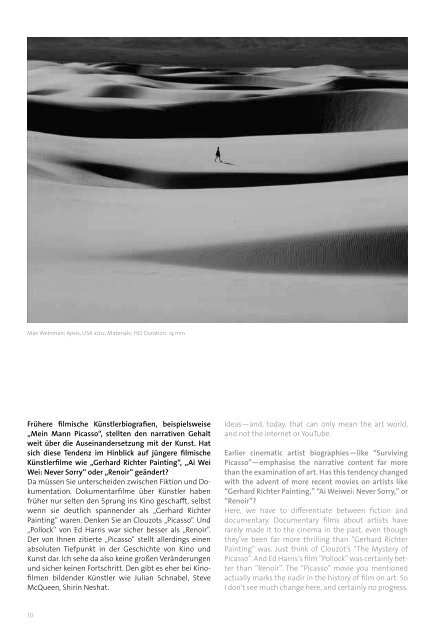Download als .pdf - KUNST Magazin
Download als .pdf - KUNST Magazin
Download als .pdf - KUNST Magazin
Sie wollen auch ein ePaper? Erhöhen Sie die Reichweite Ihrer Titel.
YUMPU macht aus Druck-PDFs automatisch weboptimierte ePaper, die Google liebt.
Wo verlaufen die Grenzen des Kinos, wenn es um die<br />
Auseinandersetzung mit und die Wiedergabe von Kunst<br />
geht? Wie gehen Filmemacher mit Übersetzungsproblemen<br />
um?<br />
Kino ist oft nicht nur an narrative, sondern auch an<br />
inhalt liche Klischees gekettet, beispielsweise an das alte<br />
Lied vom Künstler <strong>als</strong> einsamem Helden im Schaffenskampf.<br />
An solchen Klischees scheitert es immer wieder.<br />
Vor dem Münchner Festival KINO DER <strong>KUNST</strong> leiteten<br />
Sie seit 2002 die Kunstfilmbiennale in Köln und Bonn.<br />
Die Qualität des Festiv<strong>als</strong> ist in den vergangenen Jahren<br />
immer weiter gestiegen. Welche Erwartungen haben<br />
Sie persönlich an den Wettbewerb?<br />
Die Qualität der Kunstfilmbiennale und jetzt von KINO<br />
DER <strong>KUNST</strong> steigt, weil die Künstlerfilme immer besser<br />
werden – technisch, inhaltlich, konzeptuell, darstellerisch.<br />
Ich würde da in den zehn letzten Jahren von einem<br />
regelrechten Quantensprung sprechen, und genau diese<br />
Entwicklung spiegelt sich auch im Wettbewerb von<br />
KINO DER <strong>KUNST</strong>.<br />
Herr Schwerfel, wir danken Ihnen für das Gespräch.<br />
There’s more progress to be seen in the movies on artists<br />
like Julian Schnabel, Steve McQueen, and Shirin Neshat.<br />
Where do the borders lie in cinema, as far as art and the<br />
representation of art is concerned? How do filmmakers<br />
deal with the problems of translation?<br />
Cinema is often bound not only to narrative, but <strong>als</strong>o to<br />
thematic clichés—for example, that old saw about the<br />
artist as lonely hero engaged in a battle to create something.<br />
Again and again the movies run aground with<br />
such clichés.<br />
In addition to your involvement with the festival KINO<br />
DER <strong>KUNST</strong>, you have <strong>als</strong>o directed the Art Film Biennale<br />
in Cologne and Bonn since 2002. The quality of the festival<br />
has been rising steadily in recent years. What expectations<br />
do you have, personally, for the competition?<br />
The quality at the Art Film Biennale, and now again at<br />
KINO DER <strong>KUNST</strong>, has been rising because the artist films<br />
have been getting better and better, technically, conceptually,<br />
plot-wise, as well as in terms of acting. I would<br />
even speak of a genuine quantum leap during the last<br />
ten years, and precisely this development is reflected at<br />
the film festival competition KINO DER <strong>KUNST</strong>.<br />
Mr Schwerfel, thank you for the conversation.<br />
Max Weinman: Apsis, USA 2012, Materi<strong>als</strong>: HD, Duration: 14 min.<br />
Frühere filmische Künstlerbiografien, beispielsweise<br />
„Mein Mann Picasso“, stellten den narrativen Gehalt<br />
weit über die Auseinandersetzung mit der Kunst. Hat<br />
sich diese Tendenz im Hinblick auf jüngere filmische<br />
Künstlerfilme wie „Gerhard Richter Painting“, „Ai Wei<br />
Wei: Never Sorry“ oder „Renoir“ geändert?<br />
Da müssen Sie unterscheiden zwischen Fiktion und Dokumentation.<br />
Dokumentarfilme über Künstler haben<br />
früher nur selten den Sprung ins Kino geschafft, selbst<br />
wenn sie deutlich spannender <strong>als</strong> „Gerhard Richter<br />
Painting“ waren. Denken Sie an Clouzots „Picasso“. Und<br />
„Pollock“ von Ed Harris war sicher besser <strong>als</strong> „Renoir“.<br />
Der von Ihnen zitierte „Picasso“ stellt allerdings einen<br />
absoluten Tiefpunkt in der Geschichte von Kino und<br />
Kunst dar. Ich sehe da <strong>als</strong>o keine großen Veränderungen<br />
und sicher keinen Fortschritt. Den gibt es eher bei Kinofilmen<br />
bildender Künstler wie Julian Schnabel, Steve<br />
McQueen, Shirin Neshat.<br />
ideas—and, today, that can only mean the art world,<br />
and not the internet or YouTube.<br />
Earlier cinematic artist biographies—like “Surviving<br />
Picasso”—emphasise the narrative content far more<br />
than the examination of art. Has this tendency changed<br />
with the advent of more recent movies on artists like<br />
“Gerhard Richter Painting,” “Ai Weiwei: Never Sorry,” or<br />
“Renoir”?<br />
Here, we have to differentiate between fiction and<br />
documentary. Documentary films about artists have<br />
rarely made it to the cinema in the past, even though<br />
they’ve been far more thrilling than “Gerhard Richter<br />
Painting” was. Just think of Clouzot’s “The Mystery of<br />
Picasso”. And Ed Harris’s film “Pollock” was certainly better<br />
than “Renoir”. The “Picasso” movie you mentioned<br />
actually marks the nadir in the history of film on art. So<br />
I don’t see much change here, and certainly no progress.<br />
10
















